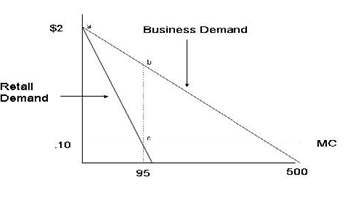Cellwave is a cellular phone company. Answer the following questions relating to its pricing policies: a. When
Question:
a. When Cellwave started out it sold to a group of homogenous retail customers. Each person€™s monthly demand for cell phone minutes was given by P = $2 - .02Q, where P = the price per minute and Q = the quantity of minutes purchased each month. Cellwave€™s marginal cost is 10 cents per minute. Suppose that Cellwave charges a single per minute price to all customers (independent of the number of minutes they use each month). What is the profit-maximizing price? Depict this choice on a graph. On a per customer basis, what are the company€™s profit, consumer surplus, and the deadweight loss?
b. Suppose that Cellwave chooses to charge a two-part tariff (with a monthly fixed charge and a per minute rate) rather than a single per minute price. What two-part tariff extracts the entire consumer surplus? What are the company€™s profits (on a per customer basis)? How many minutes does each customer use per month? What is the deadweight loss?
c. After several years of operation, Cellwave developed a new group of business customers (in addition to its old customer base). The business customers had homogenous demands. Each of these customer€™s monthly demand for cell phone minutes was given by P = $2 - .004Q. Graph the two demand curves for the two customer groups on the same figure along with the marginal cost. Suppose that Cellwave wants to menu price by offering two plans with different monthly fixed charges. Each plan would allow free calls up to some maximum limit of minutes per month. No calls are allowed beyond these maximums. Assume that Cellwave designs a plan that extracts all consumer surplus from the retail customers. Shade the area of the graph that shows how much consumer surplus must be given to each business customer to make the plan work. Explain why.

Step by Step Answer:

Managerial Economics and Organizational Architecture
ISBN: 978-0073375823
5th edition
Authors: James Brickley, Jerold Zimmerman, Clifford W. Smith Jr





